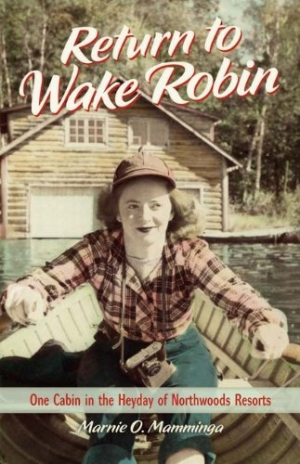Return to Wake Robin
It’s easy to idealize the mid- to late-century tradition of spending a month or two up at the family cabin. And it’s easy to forget the long drives spent stuck in the backseat with siblings, the time the dock collapsed under partying teenagers, and the sorrowful goodbyes to dear summer friends. It’s very difficult, however, to include all these elements in a book about one family’s generational camp experience and still convey the blissful sense of wonder and magic that greeted family members every time they drove into the woods.
Marnie O. Mamminga accomplishes just this in her memoir about her family’s camp in Wisconsin’s Northwoods. Wake Robin, named after a white wildflower, was built by Mamminga’s grandparents, Clara and Erle Oatman, after they enjoyed staying at different camps for several summers. Moody’s Camp, with its amazing dinners, fishing trips, and social atmosphere, was especially sweet for them. When they decided to build a cabin of their own, Ted Moody sold them a piece of neighboring land.
Though Erle only enjoyed nine summers at Wake Robin before he died of a heart attack, Clara spent every summer of her long life at the cabin, entertaining family and friends. One memorable party was in celebration of the author’s sixteenth birthday. Towards the end of the day, the crowd of dancing teenagers caused the dock to collapse into a slippery slide, which only made the festivities more fun.
Mamminga writes with warmth and obvious gratitude for her family’s treasure. A freelance writer, she strikes just the right balance between stories of reminiscence and reflections on the emotional value of the camp. Where another writer may have found herself reduced to saccharine descriptions, Mamminga keeps her prose clear and concise, a pleasure to read.
It’s easy to smell the woods, the lake, the delicious grilled food. It’s just as easy to feel the stickiness of four hot kids trying to endure a long car ride. “Our happy dispositions had evaporated like the heat waves on the blacktop, and we were now five crabby kids crammed in the belted seats of our steamy station wagon as it rolled down the highway.” Mamminga’s powers of observation translate well into a wide range of descriptive passages that offer good memories and frustrating, funny memories alike.
Mamminga’s memoir will make readers wish for a cabin of their own to call home for a couple of months out of the year.
Reviewed by
Andi Diehn
Disclosure: This article is not an endorsement, but a review. The publisher of this book provided free copies of the book and paid a small fee to have their book reviewed by a professional reviewer. Foreword Reviews and Clarion Reviews make no guarantee that the publisher will receive a positive review. Foreword Magazine, Inc. is disclosing this in accordance with the Federal Trade Commission’s 16 CFR, Part 255.

